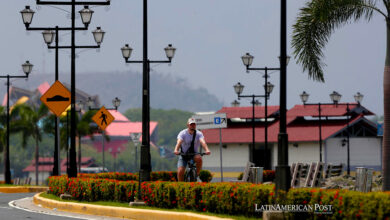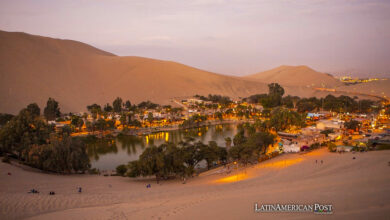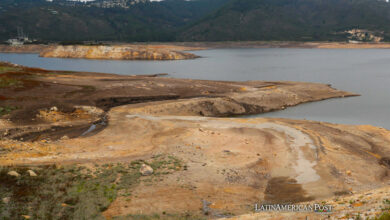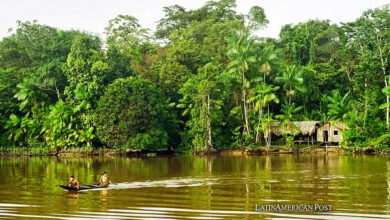Marina Silva, New Minister in Brazil, Resumes the Fight to End Deforestation
The Brazilian Ecologist and Educator Returns to the Position of Environment Minister, a Post she Directed Between 2003 and 2008, to Combat the Climate Crisis.

Photo: TW-MarinaSilva
LatinAmerican Post | Julieta Gutiérrez
Listen to this article
Leer en español: Marina Silva, nueva ministra en Brasil, retoma la lucha para acabar con la deforestación
The current president of Brazil, Luiz Inácio Lula da Silva, presented last week the people who will take charge of the 37 ministries of the Latin American country.
One of the people who stood out above the other appointments was Marina Osmarina da Silva Vaz de Lima, better known as Marina Silva; because the results during his first term were one of the most outstanding.
In 2022, she was elected as a federal candidate for the state of São Paulo, and today she returns once again to the environment ministry, announcing the creation of a Climate Authority. Since according to the Brazilian Institute for Space Research (INPE), after the Bolsonaro government, there was a loss of 20 to 25% of forest cover in the Amazon basin.
“We want to highlight the priority of what is, perhaps, the greatest global challenge recently experienced by humanity. Countries, people, and ecosystems are proving to be less and less capable of coping with the consequences of climate change and, as always, the poorest are the most affected”. The minister announced during the appointment ceremony at the Planalto Palace in Brasilia.
Who is Marina Silva?
Marina Silva is a woman who has had an ecological and political vocation since she was 28 years old. Born in Río Branco, the capital of the department of Acre, on February 8, 1958, in a large family with 10 siblings and low income.
Due to the economic situation of her family, she was forced to work collecting rubber in the Amazon with her father.
During her adolescence, she learned to read and write under the teaching of the Servant Sisters of María Reparadora. There, she had a desire to become a nun, but her vocation changed when she participated in a rural union leadership course. From that moment on, she decided to focus her life on union, environmental and political struggle.
In 1981, she studied history at the Federal University of Acre (UFAC). Shortly after, she began teaching classes as a history teacher at a basic education school. Later, she completed a postgraduate course in Psychoanalytic Theory at the University of Brasilia and another in Psychopedagogy at the Catholic University of Brasilia. During her university days, she was introduced to Marxism and in 1985 joined the Revolutionary Communist Party.
At 32, she was elected as a state deputy and four years later, she became the youngest senator in Brazil.
Thanks to her excellent performance and her desire to combat the climate crisis, in 1996 she received the Goldman Prize, which is considered the Nobel Prize for the Environment.
In 2003, she began to hold the position of environment minister for the first time during the first government of Lula da Silva. When it began to carry out its functions, deforestation in the Amazon jungle had approximately a deterioration of 27,000 square kilometers. This, without a doubt, marked a historical record at that time.
For this reason, it executed the creation of the Action Plan for the Prevention and Control of Deforestation in the Amazon (PPCDAm). This project helped reduce burning by more than half.
Thanks to these environmental achievements, Marina Silva received recognition from the British media The Guardian, which included her among the 50 people who would help save the planet in 2007. In addition, the UN awarded her the "Champions of the Earth” for its entire environmental management.
We recommend you read: Gallery: 10 Nature Restoration Initiatives Featured at COP15
What to expect from Marina Silva today?
One of the first functions of the re-elected environment minister is to recover the ministry. For this, she began with the change of name of the institution to "Ministry of Environment and Climate Change", because according to Silva, this is a gesture before the obligation to "reflect the current world debate".
Likewise, she highlighted the violence with which native peoples were subjected during Bolsonaro's government period: "It was a scenario against democracy itself, science, health, the environment, and life itself," she pointed.
In addition, as part of the transformation of the environmental policy, the minister presented the new structure of her department, since it now has the support of the Return of the National Agency for Basic Water and Sanitation (ANA) and the Brazilian Forest Service (SFB).
She also announced the creation of new secretariats:
- Control of Deforestation and Land Management.
- Human Environmental Management and Environmental Quality.
- Bioeconomy.
- Towns and Traditional Communities.
- Traditional Communities and Sustainable Rural Development.
Lastly, their task is not to neglect the importance of urban environmental policies; since the increase of large cities, the changes in land use by the dominant production models, are one of the main urban environmental crises in Brazil. "Although a good part of the Brazilian environmental heritage is in natural areas, the need for environmental policies for the urban environment is undeniable," said the minister.




